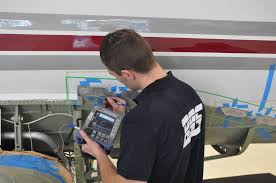NDT testing for power generation in Egypt has emerged as a critical tool for enhancing the efficiency and performance of power generation fa...
NDT testing for power generation in Egypt has emerged as a critical tool for enhancing the efficiency and performance of power generation facilities. With the increasing demand for electricity in Egypt, it is essential to ensure that power generation systems operate at their highest potential. Non-destructive testing (NDT) techniques offer a non-intrusive and cost-effective method for assessing the structural integrity and performance of power generation equipment. This article explores the significance of NDT testing in improving power generation efficiency in Egypt and the various techniques that can be employed to achieve this goal.
Enhancing power generation efficiency in Egypt with NDT testing involves utilizing non-destructive testing methods to assess the condition of power generation equipment and infrastructure. This includes using techniques such as ultrasonic testing, radiography, and eddy current testing to identify defects, corrosion, and other issues that could affect the performance of power generation systems. By regularly conducting NDT testing, power generation facilities in Egypt can identify and address potential problems before they lead to equipment failures or reduced efficiency, ultimately improving the reliability and performance of the country's power generation infrastructure.
The Importance of NDT Testing in Power Generation Facilities in Egypt

In recent years, NDT testing has become a crucial tool for the power generation industry in Egypt. With the growing demand for energy and the need to modernize aging infrastructure, NDT testing plays a critical role in ensuring the safety, reliability, and efficiency of power plants in Egypt. By utilizing advanced methods such as ultrasonic testing, radiographic testing, and magnetic particle testing, power generation facilities can identify potential defects, corrosion, and structural weaknesses, thus preventing catastrophic failures and minimizing downtime. As Egypt continues to invest in its energy sector, NDT testing will be an essential component for maintaining high performance and meeting regulatory standards.
The Importance of NDT (non-destructive testing) in power generation facilities in Egypt cannot be overstated. These facilities, which include thermal power plants, hydroelectric plants, and wind farms, are responsible for providing energy to a rapidly growing population. Ensuring the integrity and reliability of critical components such as boilers, turbines, and generators is essential for the safe and efficient operation of these facilities. NDT plays a crucial role in identifying and addressing potential defects and flaws in such components without causing damage to them. This helps prevent costly downtime, system failures, and safety hazards. By using techniques such as ultrasonic testing, radiographic testing, and magnetic particle testing, power generation facilities in Egypt can proactively assess the condition of their equipment and make informed maintenance and repair decisions. In addition to enhancing safety and reliability, NDT testing also helps power generation facilities in Egypt comply with regulatory requirements and industry standards. This is particularly important in a country like Egypt, which has ambitious renewable energy targets and is actively investing in the modernization and expansion of its power infrastructure. Overall, the adoption of NDT testing in power generation facilities in Egypt is essential for ensuring energy security, minimizing environmental impact, and supporting the country's economic development. It is therefore vital for stakeholders in the power sector to recognize the value of NDT and invest in the necessary resources and expertise to implement it effectively.
Enhancing Safety and Reliability Through NDT Testing in Egyptian Power Plants
ndt level 1 2 3

Enhancing safety and reliability through non-destructive testing (NDT) in Egyptian power plants is a critical measure to ensure the efficient and safe operation of these facilities. NDT techniques such as ultrasonic testing, radiographic testing, and magnetic particle testing allow for the inspection of crucial components and infrastructure without causing damage. By detecting defects, corrosion, and other potential issues early on, NDT testing helps to prevent equipment failures and accidents that could result in power outages or other serious consequences. Implementing regular NDT testing procedures in Egyptian power plants can greatly contribute to the overall safety and reliability of the country's electricity supply.
Investing in NDT Testing for Long-Term Efficiency in Egypt's Energy Sector

Investing in NDT (non-destructive testing) for long-term efficiency in Egypt's energy sector is crucial for ensuring the safety and reliability of critical infrastructure such as pipelines, storage tanks, and pressure vessels. NDT techniques, such as ultrasound, radiography, and magnetic particle testing, allow for the detection of defects and flaws in materials without causing damage, ultimately extending the lifespan of equipment and reducing the risk of costly failure. By implementing NDT testing practices, the energy sector in Egypt can minimize downtime, improve operational efficiency, and maintain compliance with industry regulations. Additionally, investing in NDT training and certification programs for personnel can further enhance the overall effectiveness of NDT testing in the energy sector. Overall, prioritizing NDT testing for long-term efficiency can result in significant cost savings and improved performance in Egypt's energy industry.
The Role of NDT Testing in Modernizing and Upgrading Power Generation in Egypt
NDT (non-destructive testing) plays a crucial role in modernizing and upgrading power generation in Egypt by ensuring the safety, reliability, and efficiency of power plant equipment. By using advanced NDT techniques, such as ultrasonic testing, radiographic testing, and magnetic particle testing, power generation facilities can accurately assess the condition of critical components such as boilers, turbines, and piping systems without causing damage. This allows for the early detection of potential defects, corrosion, and other issues that could lead to unexpected downtime or even catastrophic failures. Additionally, NDT testing helps to extend the service life of aging infrastructure, reduce the risk of accidents, and optimize the performance of power generation assets. In Egypt, the application of NDT has become increasingly essential as the country seeks to modernize its power generation infrastructure and transition towards more sustainable and efficient energy sources. By implementing comprehensive NDT programs, power plant operators and maintenance personnel can proactively identify and address structural weaknesses and material degradation, contributing to the overall reliability and safety of the country's power supply. Overall, NDT testing is a critical tool in the ongoing efforts to modernize and upgrade Egypt's power generation capabilities, ensuring the long-term viability and sustainability of its energy infrastructure.
Maximizing Performance and Minimizing Downtime: NDT Testing in Egyptian Power Generation
NDT (Non-Destructive Testing) is a critical component in the maintenance and operation of power generation facilities in Egypt. By maximizing performance and minimizing downtime through NDT testing, power generation companies can ensure the reliable and efficient operation of their equipment. NDT testing techniques such as ultrasonic testing, radiographic testing, magnetic particle testing, and visual inspection are used to detect flaws, defects, and potential problems in power generation equipment such as turbines, boilers, and piping systems. By identifying issues at an early stage, NDT testing helps prevent costly equipment failures and unplanned downtime. In the context of Egyptian power generation, NDT testing plays a vital role in ensuring the continuous and uninterrupted supply of electricity to meet the country's growing energy needs. It helps power generation companies adhere to strict safety and regulatory standards while also optimizing the performance and longevity of their assets. Overall, the use of NDT testing in Egyptian power generation is essential for maintaining the reliability, safety, and efficiency of power generation equipment, ultimately contributing to the stability and growth of the country's energy infrastructure.
Creating a Culture of Preventative Maintenance through NDT Testing in Egypt
Creating a culture of preventative maintenance through NDT testing in Egypt involves introducing and implementing a comprehensive program that emphasizes the regular use of non-destructive testing (NDT) methods to detect and monitor potential issues in industrial equipment, infrastructure, and other critical systems. This includes conducting routine inspections, testing, and analysis to identify and address any signs of deterioration or defects before they escalate into serious problems. By promoting proactive maintenance practices and utilizing advanced NDT technologies, organizations can enhance the reliability, safety, and longevity of their assets while minimizing the risk of unexpected failures and costly downtime. Additionally, prioritizing preventative maintenance through NDT testing can help improve overall operational efficiency, reduce maintenance expenses, and ensure compliance with relevant regulatory standards and industry best practices. This approach can ultimately contribute to the long-term sustainability and competitiveness of businesses across various sectors in Egypt.
Meeting Regulatory Standards and Ensuring Compliance with NDT Testing in Egypt's Power Industry
Meeting regulatory standards and ensuring compliance with non-destructive testing (NDT) in Egypt's power industry is crucial in maintaining the safety and reliability of power plants and equipment. NDT testing is essential for detecting defects and flaws in power generation infrastructure without causing damage to the material being tested. In Egypt, the power industry is subject to regulations and standards set by the government and regulatory bodies to ensure the safe operation of power plants and equipment. Compliance with these regulations is necessary to avoid accidents, equipment failures, and environmental damage. To meet regulatory standards and ensure compliance with NDT testing in the power industry, organizations must adhere to established testing procedures and techniques, such as ultrasonic testing, radiographic testing, magnetic particle testing, and liquid penetrant testing. Additionally, qualified and certified NDT technicians are required to perform and interpret test results accurately. Regular inspection and testing of critical components, such as boilers, turbines, and piping, are necessary to identify and mitigate potential issues that could affect the performance and safety of power generation facilities. Non-compliance with NDT testing regulations can result in penalties, legal action, and reputational damage for organizations in the power industry. Ultimately, meeting regulatory standards and ensuring compliance with NDT testing in Egypt's power industry is essential for maintaining the integrity and safety of power generation infrastructure. By following prescribed testing procedures and employing certified technicians, organizations can demonstrate their commitment to safety and regulatory compliance in the power sector.

ليست هناك تعليقات